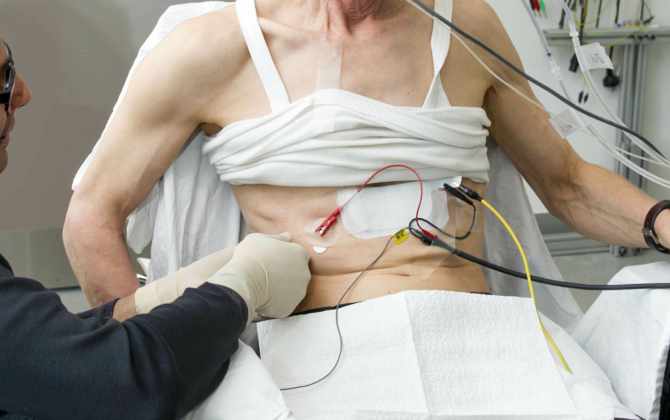Jump to
After cervical spinal cord injury (SCI), the respiratory muscles are partly or completely paralysed. This has two major clinical consequences: a decreased ability to get air into the lungs and a decreased ability to cough and remove secretions. This results in a lifetime of recurrent respiratory tract infections (2/year/person) that often progress to pneumonia with frequent and extended hospital admissions. People with cervical SCI are 150 times more likely to die from respiratory complications than the general population, as many as 28% die within the first year after injury. For those that survive the first year, a cervical SCI has a lifetime cost of $9.5million, a large proportion of which is attributed to respiratory-related complications. A recent longitudinal study of people with cervical SCI showed that respiratory muscle weakness is associated with incidental pneumonia. Respiratory muscle weakness also causes dyspnoea (breathlessness) and sleep-disordered breathing, which is 4 – 10 times more prevalent in people with SCI than the able-bodied population. Therefore, there is an urgent need to identify a simple and cost-effective treatment for respiratory muscles weakness to prevent respiratory complications after SCI, improve quality of life and reduce the burden on the healthcare system.
Our primary aim is to determine definitively the effectiveness of training on respiratory muscle strength, respiratory physiology and health outcomes. To do this we will conduct a randomised controlled trial 2 times bigger than the largest previous study, of respiratory muscle resistive load training in individuals with acute and chronic cervical SCI. The project will provide critical new knowledge about the efficacy of a simple and inexpensive respiratory muscle training régime, which can be applied immediately in the hospital and community, to minimise respiratory morbidity in people with SCI. This project also provides a unique opportunity to investigate other consequential effects of long-term respiratory muscle training that have never been studied in people with SCI. These include effects on cough efficacy, sleep-disordered breathing, breathlessness, respiratory morbidity, respiratory health and neural drive to the diaphragm, as well as quality of life.


